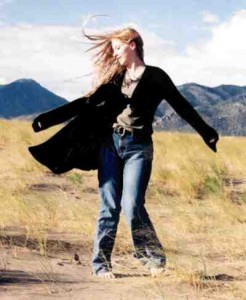Essay by Alexa Mergen
Environment – April 2007 – Colorado Central Magazine
MY LATE GRANDMOTHER, Helen, was a lifelong Republican who, along with her sheep-ranching sister, bristled at the Endangered Species Act, both shaking their heads when they talked about tortoises getting more rights than people. In spite of cancer running through the family like uranium ore in the ground, my great-uncle mined uranium to keep the ranch out of hock, and Helen liked to say that atomic testing had to happen somewhere, and well, the desert has a lot of open space.
On my visits to Helen in rural Nevada — coming sometimes from the University of California at Berkeley, which she maintained “ruined me” with its liberal agenda — she told me that Eastern environmentalists didn’t understand the land. She was born in Colorado, raised in Utah and lived in remote parts of Nevada for 55 years. There wasn’t a sagebrush big enough to hide behind when she got talking about California’s water greed.
Helen loved the desert, walking to look at flowers and sitting under the nighttime sky, and she understood that people needed to use what the West provided. Maybe that’s why in her own life — she lived to be 90 — she conserved what she could and lived so simply she embodied an environmental awareness in ways that those of us swapping our incandescent bulbs for fluorescent and studying the mileage of new cars, may never achieve.
As my grandmother watched Las Vegas grow bigger and brighter, she would shake her head as she filled the same teapot she’d used when my mother was a child. Those of us baptized into environmental awareness after Earth Day 1970, and indoctrinated by the fuel crisis of the ’70s, have meanwhile been ripping out serviceable kitchen countertops and new carpet to replace them with updated styles. I could never get Helen to understand that constant need for something new.
My grandmother’s porcelain sink and Wedgewood range were like a well-made wool sweater and a pair of resoled boots: reliable, functional and forever hip. I think you could say that 60 years ago, Helen hit on a personal style and stuck with it. She’d tell stories about “making over” clothes from clothes, reworking a wool skirt into a small jacket for her daughter, turning the yarn from a sweater into a pair of socks.
Her style was Oxford cloth blouses and denim skirts. She bought a few of good quality and wore them until the fabric thinned from repeated washings and drying out on the clothesline. Then they became rags, quilt pieces, doll clothes or finally, cushions for cats. She grew fruits and vegetables and never dreamed of spraying anything on them, watering conscientiously before dawn. And she cooked from scratch, limiting her trash. She brewed coffee at home and carried snacks when she traveled. Eating out was rare and a treat.
SHE COMPOSTED AND RECYCLED, and when it got that she couldn’t carry the cans to the curb, supervised helpers while sitting on her reupholstered sofa, scolding them if an empty toilet paper roll slipped into the garbage. She liked anything made of cardboard, bending it to make spools for skeining yarn.
Helen also read, handling books so carefully you would think they were irreplaceable. They were to her. Living apart from the Internet, cable television, movies and glossy magazines, my grandmother never got to see the world as a place of infinite stuff. Everything she cared for, she expected to endure.
I think you could call Grandma Helen Stephensen McBain an original environmentalist, though I never had the nerve to tell her that before she died last summer. Both the example of her life and old kitchen range live on: The stove went to Santa Maria, Calif., to the home of the mother of the mover who came to empty out the house that Helen had lived in for 52 years.
Alexa Mergen is a contributor to Writers on the Range, a service of High Country News in Paonia, Colorado (hcn.org). She is a writer and poet in Sacramento, California.


